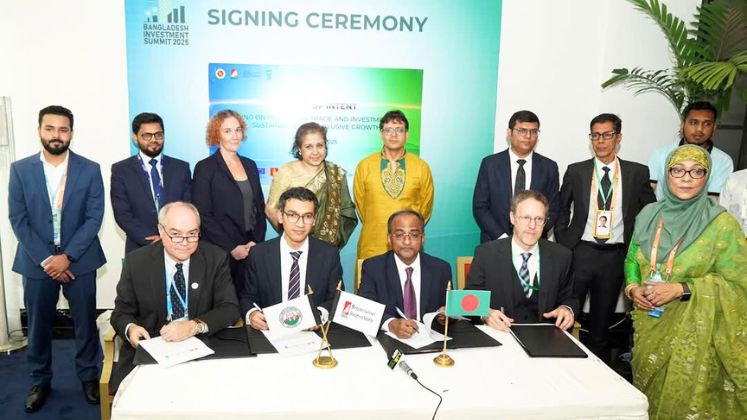
In a significant step towards enhancing supply chains as catalysts for inclusive growth and job creation, Bangladesh has launched a pioneering collaborative platform involving both Government and industry stakeholders. This initiative was unveiled at the BIDA Investment Summit.
The new platform is designed to facilitate policy discussions and knowledge sharing, bringing together policymakers and industry leaders to explore the necessary policies and investments that support decent work, local job creation, productivity, and economic growth. It aims to encourage proactive industry leaders to exchange successful practices, thereby enhancing value addition, improving working conditions, and increasing competitiveness in global markets.
The Platform for Resilient Supply Chains was formally established through a Letter of Intent (LoI) signed by the Bangladesh Investment Development Authority (BIDA), the Ministry of Commerce (MoC), the International Labour Organization (ILO), and the United Nations Development Programme (UNDP). The signing ceremony was also attended by representatives from the Asian Development Bank (ADB) and the International Finance Corporation (IFC).
The LoI sets forth a detailed framework for cooperation, which includes the establishment of thematic and sectoral working groups supported by a secretariat comprising BIDA, MoC, ILO, and UNDP. Development partners have praised this initiative as a model for more coordinated development cooperation and public-private dialogue, particularly as development aid increasingly focuses on impactful, scalable projects.
This initiative is particularly timely as Bangladesh prepares for its transition from Least Developed Country (LDC) status in 2026, aligning with the Government’s commitments to the ILO’s Committee of Experts on the Application of Conventions and Recommendations (CEACR) as outlined in the Labour Sector Reform Roadmap (2021–2026).
Ashik Chowdhury, Executive Chairman of BIDA, remarked, “The signing symbolises our shared goal to establish Bangladesh as a premier destination for responsible investment. By aligning public policy with private sector initiatives, we are cultivating an environment that encourages innovation, good governance, and business growth.”
In a joint statement, Tuomo Poutiainen, ILO Country Director, and Stefan Liller, UNDP Resident Representative, noted, “This initiative represents a new paradigm in development cooperation that emphasises policy coherence, cross-sector collaboration, and national ownership. By integrating decent work standards into trade and investment strategies, Bangladesh is setting the groundwork for more resilient, inclusive, and job-rich growth.”
Additionally, Team Europe and Global Affairs Canada expressed their strong support for Bangladesh’s dedication to decent work and responsible business practices. They highlighted the significance of this partnership as Bangladesh approaches its LDC graduation in 2026, aiming to diversify exports, strengthen labor rights, and bolster the country’s reputation as a responsible sourcing option.
The partners are set to initiate operational activities and engage stakeholders beginning in the third quarter of 2025.






